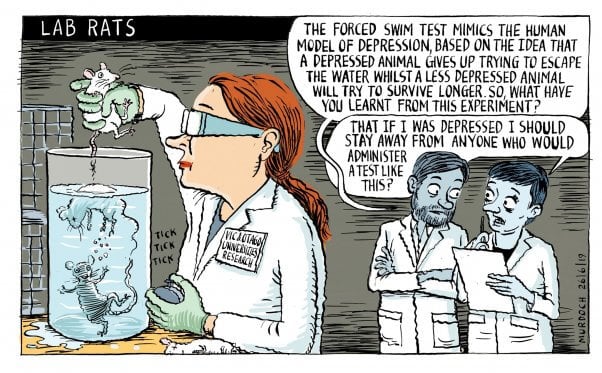PETA’s Global Fight to End the Forced Swim Test Hits New Zealand
PETA’s global fight to end the cruel and useless forced swim test has hit New Zealand. PETA neuroscientist Dr. Emily Trunnell has, for months, lent scientific expertise and provided scientific reports to two animal advocacy groups in New Zealand already fighting for an end to the test—the New Zealand Anti-Vivisection Society (NZAVS) and Save Animals From Exploitation (SAFE)—which recently hand-delivered a letter to the vice chancellor of Victoria University of Wellington, asking the school to end its use of forced swim test experiments on animals.
That action has been supported by appeals from concerned students of the university, kiwi celebs who have taken action on the cause, a cartoonist (see below), and over 13,000 compassionate people in New Zealand who signed a petition asking Parliament to enact an immediate ban on the forced swim test, yet the school refused to budge. That’s why PETA and PETA Australia have sent another letter to officials at the school, countering their reasoning for continuing the test and asking them to reconsider.

New Zealand cartoonist Sharon Murdoch reveals the absurdity of the forced swim test.
In the sham-science forced swim test, experimenters put mice, rats, guinea pigs, hamsters, or gerbils in inescapable containers filled with water. The panicked animals try to escape by attempting to climb up the sides of the beakers or even diving underwater in search of an exit. They paddle furiously, desperately trying to keep their heads above water. For more than 40 years, experimenters in university and pharmaceutical laboratories have been dosing animals with various drugs and then dropping them into cylinders of water to measure how long they struggle.
PETA scientists identified 47 compounds that were tested on animals and found that even though 36 of them showed promise as having antidepressant characteristics using the outdated forced swim test, none of these compounds is currently approved to treat human depression.
The research showed that the forced swim test was less predictive than a coin toss at determining whether a compound would actually help humans suffering with depression, yet animals were tormented anyway to perform it.
Learn more about the forced swim test on The PETA Podcast:
“The forced swim test does not reliably predict successful novel treatments for human depression—nullifying any scientific justification for conducting the test. … [T]here is no real detriment to banning the forced swim test entirely. Doing so would not lead to the use of ‘more harmful or less appropriate techniques,’ as the forced swim test is itself never appropriate.”
—Dr. Emily Trunnell
“Because the forced swim test lacks scientific value and causes immense suffering to animals, we have launched a global campaign aimed at ending its use entirely. . . . We hope to see Victoria University of Wellington move in the same progressive direction that these massive companies have and become the first university in New Zealand to commit to no longer funding or conducting this cruel, irrelevant test.”
—Dr. Emily Trunnell
The forced swim test is bad science. These experiments do nothing more than terrify animals and delay development of new effective treatments that are desperately needed.
What You Can Do
After discussions with PETA, three of the top 10 pharmaceutical companies, AbbVie, Johnson & Johnson, and Roche, have now committed to ending forced swim test experiments permanently. But other corporations, including Bristol-Myers Squibb, Eli Lilly, and Pfizer, have refused to enact a ban on the use of this test. Take action—tell them what you think about that right now:

